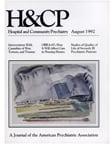An Estimation of the Impact of OBRA-87 on Nursing Home Care in the United States
Abstract
The Omnibus Budget Reconciliation Act of 1987 (OBRA-87) established criteria for Medicare-or Medicaid-certified nursing homes to use in admitting or retaining mentally ill patients. In effect, the law created five dispositional categories for residents or potential residents of nursing homes. Using data from the 1985 National Nursing Home Survey conducted by the National Center for Health Statistics, the authors estimate what proportion of nursing home residents would fall into each of the categories. They suggest that the initial impact of the law will be to shift costs from federal programs to the states. Nursing homes will be expected to provide more mental health services, in the absence of other services, the regulations have a high potent ial for creating homelessness and continuing a pattern of failure to adequately serve patients with serious mental illness.
Access content
To read the fulltext, please use one of the options below to sign in or purchase access.- Personal login
- Institutional Login
- Sign in via OpenAthens
- Register for access
-
Please login/register if you wish to pair your device and check access availability.
Not a subscriber?
PsychiatryOnline subscription options offer access to the DSM-5 library, books, journals, CME, and patient resources. This all-in-one virtual library provides psychiatrists and mental health professionals with key resources for diagnosis, treatment, research, and professional development.
Need more help? PsychiatryOnline Customer Service may be reached by emailing [email protected] or by calling 800-368-5777 (in the U.S.) or 703-907-7322 (outside the U.S.).



